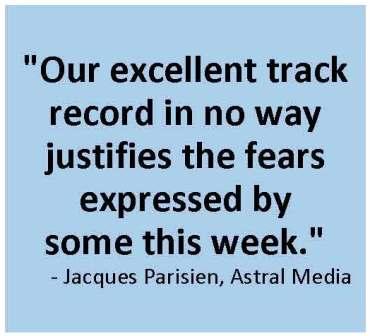
MONTREAL – Both of Canada's two French-language private television networks made commitments to increase local news programming as CRTC hearings concluded Friday in Montreal.
Remstar, which bought the TQS network out of creditor protection in 2008 and eliminated its news-gathering operations, read the writing on the hearing walls and committed to increase local news programming on its five owned-and-operated stations after spending the week resisting calls to do so.
In '08, the CRTC gave what is now called V Interactions three years of reduced local news minimums when the station was purchased (from Cogeco and CTV) and said it would revisit the issue in 2011. V outsources what little local news it does to production house Trio Orange, and airs entertainment programs during the traditional 5-7 p.m. news hours, a strategy that has resulted in large ratings boosts and, for the first time, a modest profit for the network.
As of September 2012, Remstar president Maxime Rémillard announced Friday, V will broadcast two and a half hours of local news a week in Montreal and Quebec City, and one and a half hours in Saguenay, Sherbrooke and Trois-Rivières. Each is half an hour more than current commitments. Rémillard said this is on the condition that the network continue to receive its current level of funding from the Local Programming Improvement Fund.
Rémillard added V Interactions would also no longer count repeats of newscasts as part of its local news commitments, which will probably end the practice of airing newscasts at 7 a.m. and then immediately repeating them at 7:30 a.m. Rémillard said V would ensure that at least half of all news on local newscasts is destined for that station's audience. Currently, local newscasts contain many stories produced for other markets.
V Interactions also committed to hiring, by the end of January, a person to manage the network's news operations and liaise daily with Trio Orange to improve the quality of newscasts.
As part of the license renewal for the Quebecor-owned TVA network, Groupe TVA asked the CRTC to delete a requirement in the license of its Quebec City station CFCM that nine of its 18 hours of locally-produced programming be exclusive to that market. TVA president Pierre Dion argued that the restriction prevented the network from airing programming produced by CFCM on other stations, which would expand the exposure of Quebec City and counter the "Montrealization" of francophone media that the restriction was designed to discourage.
CFCM's union argued the restriction doesn't prevent TVA from airing CFCM programming across the network. It worried that programs produced in Quebec City for the network would be stripped of local flavour, and points to weekend morning show Salut Bonjour Week-End as an example of this. On Friday, Dion maintained his request for more flexibility, but said that TVA would commit to a minimum of five and a half hours a week of local news in Quebec City, including the introduction of half-hour local newscasts at 6 p.m. on Saturdays and Sundays. Currently there is no local news on weekends at CFCM.

For its network as a whole, TVA asked that minimum requirements for priority and independently-produced programming be eliminated, replaced with a single condition that requires 75% of programming expenditures be on Canadian programming. This resulted in objections from independent producers, worried that TVA might bring more production in-house.
On Friday, Dion dismissed those worries, saying TVA will continue to use independent producers and invest in original programming, simply because the demands of its audience for French-language programs force it to. Asked by the commission if TVA would accept a floor of 80% Canadian programming expenditures, averaged over the length of the license, Dion said they would, provided other restrictions were removed.
TVA also announced during Friday's hearing that, thanks to new investments, all regional programming will be closed-captioned as of Monday. Commissioners had expressed worries earlier in the week that TVA was not meeting its obligation to caption 100% of its programming.
Astral Media, which is in the unique position of being an evenly-split bilingual operation composed of specialty and pay TV channels, spent most of the week justifying its demand to be licensed as a group, as is now the case for large English-language broadcasters like Bell Media, Shaw Media and Corus. Many critics intervened, worried that Astral would use this flexibility to spend more money producing Canadian French-language programming, which has a larger audience. Astral said it has no intention of doing so. "Our excellent track record in no way justifies the fears expressed by some this week," said executive vice-president Jacques Parisien.
But Parisien said Astral would not accept a condition of license preventing it from transferring obligations between language groups because he said it would be unfair to do so to Astral and not to other groups. Instead, Astral proposed Canadian programming expenditure minimums for each service individually, and increasing its total Canadian programming spending from the current 28.6% to a minimum of 30% of total programming spending.
The Commission will decide on new French-language television regs, and license renewals for TVA, V and Astral in early 2012.


